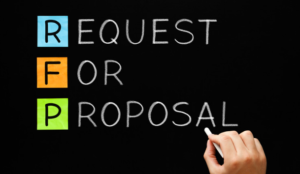
How to Write an Engineering RFP?
Table of Contents
RFPs are an essential element of any large-scale engineering project. Whether it’s civil engineering, industrial engineering, electrical engineering or any other kind, there is always a necessity for a lot of material and equipment.
The various different sectors within engineering amount to an industry that is massive, and so when you are trying to get your project up and running you are entering into a highly competitive environment. The intention of your RFP is to attract the attention of the vendors and service providers to ensure that you have a strong list of options bidding on your proposal. Without it, a project can be doomed to mediocrity before the work has even started.
Many projects have failed due to a lack of information, tone, and structure of the business, so an initial RFP cannot define the potential of the business. It is important to spend more time to create a solid RFP, here’s how to go about writing an engineering RFP:
Clearly Define Your Needs

Every single piece of information regarding what you need to complete your business needs to be outlined in the RFP. If you forget something, or if you aren’t 100% clear about something you could end up getting bids from people who can’t actually get the job done. And in some cases, you might not realize this until the project is already underway. You could be working with a vendor who doesn’t provide certain essential aspects of what you need and this fact won’t become clear until it’s too late.
You should familiarize yourself with the difference between direct and indirect procurement. Indirect is procuring the supplies necessary for a business to operate, whereas direct is to do with supplies for creating goods and services. Clear your doubts on which of these projects you’re proposing is related to because different vendors will specialize in each of them. Then you need to start getting more specific, and I would suggest using bullet points so that it’s succinct and easy to read.
You must propose physical needs such as equipment, materials and manpower. You also have to make it clear how you want the job done. Any specific requirements in regards to what you want the end result to look like and if you have a vision for the process. It’s also essential that you clarify the timeline. Some vendors might be interested but may not necessarily be able to complete it within your deadlines. And then, of course, you have to fill them in on the details of your budget.
Detail Your Company’s History

This is another important aspect of your RFP because anyone who is going to work with you is going to want to know what kind of company they’re investing in to make money. This is a two-way relationship at the end of the day. As much as you want to be sure that you are making the right choice, the vendors will need to have some assurances of their own. A lot of them might be entirely unfamiliar with your company so you need to include a lot of relevant details.
I’m not suggesting that you talk about every single event in the company’s history, but you should for sure give an overview of the origins of the business and what your contribution to the industry has been over the years. You should also talk a bit about some of the other projects that the company has worked on recently. This will give the vendors a good idea of what kind of a work environment and coworking spaces they can look forward to, and they can also see how successful past operations have been.
You have to be completely honest here. Don’t hide any past issues or mistakes. If it’s discovered by the vendor that you lied in your RFP, they will likely be well within their rights to pull out of the project at any stage they want.
Don’t Overdo it With Irrelevant Questions
What you can expect when you start getting bids from potential vendors is an awful lot of questions. Once again, they want to be sure they are making the right choice if they work with you and so they will be looking for a lot of info. Don’t be afraid to ask some questions of your own too. This is your project after all and so the decision you make after submitting the RFP is a huge one that you don’t want to end up taking lightly.
So there are all kinds of questions that you should ask in your RFP. You want to ask everything from general questions about their company to the technology they have access to, their history with other projects and what you can expect in terms of pricing. The tricky part of this is that if a vendor sees too many questions they might be put off from bidding and so you have to make sure you don’t ask anything irrelevant or redundant. Try and keep the list of questions as short as possible while still covering all of the important bases. You should also ask for references so that you get a more well-rounded view when the bids start rolling in.
Proofread the RFP Multiple Times

With attention to detail in mind here, if you send a proposal that hasn’t been proofed, the vendors are going to pick up on that and it’s going to give them bad vibes right out of the gate. It gives an impression of carelessness and laziness. You could also end up misrepresenting some of your needs or leaving them out entirely. For an engineering project, you can’t really afford to be lacking in essential equipment, and a badly proofed document may leave some such equipment out unintentionally.
Has the proposal been proofed a couple of times before sending it off to try and avoid this? Once again, the success of a major engineering project could live or die on the strength of the initial RFP. The most important thing to remember is to be clear on all aspects of what you need from the vendor. Every sector of engineering necessitates a substantial amount of equipment and manpower, and a good RFP can set that stuff up nicely for you.
Author Profile
- Blogger by Passion | Contributor to many Business Blogs in the United Kingdom | Fascinated to Write Blogs in Business & Startup Niches |
Latest entries
 Business NewsJanuary 17, 2025UK Job Creation: Analyzing Economic Policies, Challenges, and Future Opportunities
Business NewsJanuary 17, 2025UK Job Creation: Analyzing Economic Policies, Challenges, and Future Opportunities FinanceDecember 16, 2024The Evolution of Financial Modeling: From Spreadsheets to Expert Consulting
FinanceDecember 16, 2024The Evolution of Financial Modeling: From Spreadsheets to Expert Consulting BusinessDecember 16, 2024Expense Management for Contractors: What Expenses Can Be Claimed Inside IR35?
BusinessDecember 16, 2024Expense Management for Contractors: What Expenses Can Be Claimed Inside IR35? BusinessDecember 12, 20245 Creative Ideas for Your Customizable Bags in Bulk
BusinessDecember 12, 20245 Creative Ideas for Your Customizable Bags in Bulk

